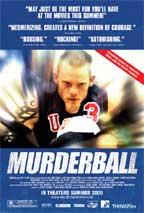Murderball

Abandon all mushy sympathy, all ye who watch
Official Murderball SiteDocumentary, Sports/General Interest
Players Mark Zupan, Joe Soares, Keith Cavill, Andy Cohn, Scott Hoggsett, Bob Lujano
Rated R (for language and sexual situations, brief nudity)
Running Time: 88 Minutes
Released:July 29th, 2005




4 Out Of 5 Bites
Consider, for a moment, what you think you don't know about the quadriplegic existence and recollect all the accident/survival/victory stories and vignettes you've read, seen or heard. Consider, even, the questions you may or may not have ever wanted to ask.....such as, 'How does a quadriplegic have sex?' (Who knew there was a medical video on the subject?) Murderball attempts to answer these and at once wants to move us into our discomfort zone so we not just appreciate the courage and admire their tenacity to rediscover a functional life. For those who are still functionally bi-pedal and perhaps don't have a quadriplegic close friend or relative, it is hard to grasp life as a "quaddie" (as some refer to themselves in the film). Murderball brings us closer than ever.
While it can be touted as a sports documentary, the sport of quad rugby- (it used to be called "murderball")- is really the vehicle that delivers the film's message that quadriplegics can have real lives with fulfilling challenges- often in ways one might not expect. But don't get weepy and sympathetic for them.....they just might crash you onto your bum.
Imagine a crash-up derby in hi-tech, redesigned wheelchairs that are plated, welded and strategically strengthened. Throw a ball into their midst and let the raucousness ensue. The catankerousness is compelling and the toppling wheelchairs spilling their drivers on the game floor are pictures that remain emblazoned in your mind.
Centered against the backdrop of US Olympic Wheelchair Rugby team's quest for a twelfth consecutive championship victory is mainly the sport's go-to guy, Mark Zupan. Henry Alex Rubin and Dana Adam Shapiro do not go all out on the feel-good, spic-and-span track. With Zupan, you get a rough and tumble, cocky, yet confident "in your face" kind of guy and Murderball goes with him from beginning to end. His honesty is brutal sometimes, if not disagreeable. But you wind up respecting him for that, and much to the point of losing sight of the fact that Zupan is confined to a wheelchair. His necessary bravado and his leadership eclipse that much.
Zupan, the film's essential anti-hero, becomes the prototype for the parallel life-stories of not only the quad-athletes on the teams, but for their family members and loved ones. They become outside interpreters, allowing us a perspective on what might otherwise just be a documentary about quadriplegic rugby players. But, again, this is a film about life lived above potentially insurmountable blockades of body and mind. Additionally, the profile of a newly quadriplegic young man, Keith Cavill is highlighted as he is inspired by a visit from Zupan.
Zupan's condition is a result of a drunk-driving accident at the hands of one of his best friends. The tension between the two is resolved in a naturally (for the tenor of the film), unsentimental way. Opposing Zupan is Joe Soares, a former star on the US quad rugby circuit who feels shunned after being cut by the team. He bolts to coach the Canadian team against the Americans- and thus, Murderball has its instant and most obvious conflict to magnify.
Soares is perhaps the most compelling life we glimpse, especially if we are interested in how these people's lives are impacted beyond the athletic endeavor. At the outset, we don't know whether to hate him or sympathize with him. We can understand his competitive quest that almost costs him his life, but is he an athlete's Benedict Arnold? Certainly, he's a hard-nosed father, stony and resilient, but authentically loving to his son, who is a violin-playing polar opposite of dad. He successfully creates the sense of family amongst his Canadian players, talking frankly about such over meals with them. After suffering a heart attack, one might conclude that Soares' edge is softened but the depth of the man emerges.
The rivalry between the US and Canadian teams is obviously mirrored in the vitriolic rivalry of Zupan and Soares. Eventually, Canada does exact its revenge, and later, the US team does not go all the way in the 2004 Paralympic games. There is no Miracle victory for the US but all around, there are real people finding real purpose in spite of the circumstances they have been dealt. Life goes on behind the scenes even when the storied finishes do not pan out. The victories must be mined in the inevitable mundaneness of the life that follows for both the on-court victors and the vanquished.




